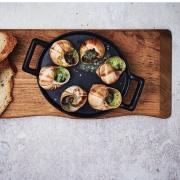Rory Souter of The Cotswold Cider Company is on a mission. In the face of the mass production of industrialised ciders, he is passionate about the ancient art of cider making and is striving to bring us the true taste of English cider – aromatic, deeply golden with a bite of something bittersweet that leaves the tongue tingling.
His eclectic “family” of ciders offers up a range of inventive styles that satisfy today’s thirst for the unusual, but each one is grounded in the same classic slow fermentation of carefully selected cider apple varieties. He’s serious about quality and, while his stylish branding is playfully anarchic, the cider conforms to strict rules: ‘No concentrate, no sugar, and use only locally-sourced apples and slow fermentation to achieve the perfect balance of flavour and alcohol content.’
Cider is as deeply rooted in rural England as the myriad apple trees that grow in its soil; the symbiosis of the two making the production of cider an inevitable part of having an orchard. Rory’s own journey into cider-making began when he and his wife moved into an old water mill in the Oxfordshire village of Coleshill back in the early 2000s. They couldn’t have known then how the presence of a few well-established and slightly neglected apple trees would change their lives.

Autumn came, and with it apples – hundreds of them. Rory was lovestruck – the beauty of the fruit, their scent and delicious taste, and the seasonal inevitability of their arrival in his garden sparked the beginnings of an abiding passion. The harvest was more than they could manage to eat, so, like orchard owners since time immemorial, pressing and fermenting them for cider seemed the obvious thing to do.
He borrowed a press from a local wine merchant and produced his first batch. Inevitably, because nothing really worthwhile comes easily, this cider was not great: his homegrown combination of cooking and eating apples didn’t have what it takes to make the ‘real good’ cider he was dreaming of. The research began, and he learned that he would need proper cider apples to deliver the right product.
‘There are around 60 varieties of cider apples,’ he says, ‘really ancient ones that have stood the test of time. It’s the complex tannins in the juice of these apples that makes cider taste the way it should. There’s no substitute for their sharply bittersweet flavour.’

As Rory’s interest grew, so did his conviction that what he was looking for was a revival of something that had got rather lost in the haze of mass-produced ciders – which all too often are the only products most people know. He took on the lease of a local orchard in 2009 and began to get into his stride, producing his first cider – dry, still, opaque, amber-coloured – which would prove to be the father of all the ciders to follow. The cider-making was still a hobby at this stage, but the principles of traditional methodology were front and centre: only using juice from traditional heritage varieties, sourced locally; not adding any sugar; allowing the cider to ferment and mature slowly to allow depth of flavour to develop. He began to experiment with natural flavourings and the addition of carbonisation, and the Cotswold Cider Company’s family began to expand. New members emerged over the next five years, and the recognition his ciders received within the industry, winning plaudits and significant contracts, persuaded Rory to turn his amateur passion professional in 2016.
The ciders stand out not only because of their high quality, but for their witty and anarchic branding – something Rory should be really proud of. They are gorgeously presented, with labels reminiscent of Victorian playbills, the graphics supported with subtle artwork that gives each one a distinct personality. The father-figure was christened No Brainer – ‘always the obvious choice!’ – and the names of the others – Sideburns, Sweet Cheeks, Blowhorn, Tuk Tuk – inspired local artist Lee Hiom to create instantly recognisable characterisation for their labels. ‘I wanted a playful aesthetic that inspired fun and enjoyment,’ he says, ‘putting a bohemian twist on tradition – the way Giffords’ Circus has brought the old notion of a travelling circus to a modern audience.’ The circus also started life modestly in the Cotswolds, and has grown to national acclaim – quite an inspiring fellow-traveller!
In his wonderful book Cider Country, James Crowden describes a renaissance in the world of artisan ciders. He describes cider as a way of life that you fall into by accident or chance, a ‘secret world that beckons you from afar… the gateway into a rustic way of life which lies buried deep within our own consciousness and ancestry.’ New makers like Rory Souter across Britain are devoting themselves to the purer principles of cider making, fuelled by passion and commitment to quality and authenticity in a world of short-cuts and easy flavour cheats. Cider for them is not just a drink steeped in the traditions of rural life, a golden elixir that transports drinkers back to a time of slower pleasures and thoughtful sipping, it is the lifeblood of a revolution in how the world sees – and tastes – the real thing.




























